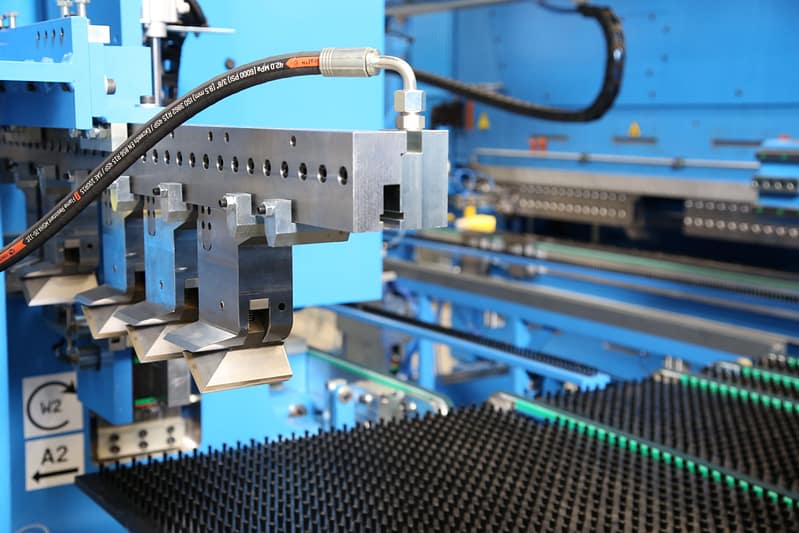Welcome to the World of Folding Technologies
Let’s dive into the fascinating realm of folding technologies, which have truly turned the sheet metal fabrication industry on its head! Gone are the days of relying solely on standalone CNC machines. Now, with a sprinkle of automation magic, folding technologies are making waves by boosting efficiency and precision in bending metal sheets. This is a game-changer, especially for industries that churn out high volumes and need to keep setup times to a bare minimum. Imagine running parts in a single swoop and slashing cycle times—it’s like hitting the productivity jackpot!
At the core of these folding wonders is their gentle touch with sensitive materials. Thanks to cutting-edge bending processes, they handle materials with kid gloves, avoiding any nasty scratches or dents. Plus, they’re as flexible as a yoga instructor, bending both negative and positive angles with ease. Fully programmable dimensions and sequences? You bet! This adaptability makes folding technologies a dream come true for industries that crave precision and efficiency.
Industries Riding the Folding Technology Wave
Several industries have jumped on the folding technology bandwagon, and for good reason! Take the automotive industry, for instance. It’s all about precision and speed when crafting those intricate components with tight tolerances. Folding technologies are like the Swiss Army knife of manufacturing, handling everything from pre-painted to stainless steel with finesse. Quality and consistency? Check and check!
And let’s not forget the construction industry, where folding technologies are the unsung heroes behind metal components in building structures. With the ability to churn out large batches with minimal fuss, construction projects can roll on without a hitch. Need custom parts for a specific project? No problem! Folding technologies have got you covered, making them a hot favorite in the construction world.
In the electronics realm, folding technologies are the secret sauce behind those sleek enclosures and casings for electronic gadgets. Precision and repeatability ensure that components fit together like a glove, keeping electronic products in tip-top shape. Handling thin materials without a scratch? It’s a walk in the park for these tech marvels, especially when dealing with delicate components.
Boosting Manufacturing Efficiency
Folding technologies are like a breath of fresh air for manufacturing efficiency, streamlining production processes and cutting down on manual labor. Automated folding lines, like those from Pivatic, are the superheroes of the manufacturing world, cranking up throughput with fewer resources. In industries where demand is as unpredictable as the weather, this flexibility is a lifesaver, allowing manufacturers to scale up or down without breaking the bank.
Integrating folding technologies into manufacturing lines is like adding a turbo boost to setup times. Quick transitions between production runs mean less downtime and more machine action. For manufacturers juggling a wide range of products, this is pure gold. Plus, the precision of folding technologies means parts are spot-on, reducing the need for rework and upping the ante on product quality.
What’s Trending in Folding Technology?
As industries evolve, new uses for folding technologies are popping up like mushrooms after rain. One exciting trend is the marriage of folding technologies with other manufacturing processes, like spot welding and clinching. This dynamic duo creates complex assemblies in a single production line, cranking up efficiency and cutting down on production stages.
Another trend catching on is the use of folding technologies for lightweight materials. As industries aim to shed some pounds for better performance and sustainability, folding technologies step in to handle thin and delicate materials without missing a beat. This is music to the ears of the aerospace and automotive sectors, where weight reduction is the name of the game.
Digital technology is also shaking things up in the folding world. Advanced software and control systems are like the secret sauce, offering greater precision and customization in the folding process. This opens up a world of possibilities for innovative product design and manufacturing. Exciting times ahead!
Challenges and Hurdles
Of course, it’s not all sunshine and rainbows. Folding technologies come with their own set of challenges and limitations. One biggie is the initial investment needed to get automated folding lines up and running. While the long-term benefits often outweigh the costs, the upfront expense can be a tough pill to swallow for smaller manufacturers or those on a tight budget.
Then there’s the need for skilled operators to keep these folding marvels in tip-top shape. While automation cuts down on manual labor, it also demands operators who know their stuff to ensure everything runs smoothly. This might mean extra training and development for the team, which can be a bit of a time and money sink.
Material limitations can also throw a wrench in the works. While folding technologies can handle a wide range of materials, some might need specialized tooling or processes to get the job done right. Manufacturers need to do their homework and make sure their folding tech is up to the task.
The Bright Future of Folding Technologies
The future’s looking bright for folding technologies, with advancements on the horizon set to supercharge efficiency and capability. As industries put a premium on automation and precision, folding technologies will be front and center in meeting these demands. The ongoing development of new materials and processes will also broaden the horizons for folding technologies, paving the way for innovation and growth.
In the coming years, expect to see more integration of folding technologies with other manufacturing processes, along with the evolution of digital control systems to boost precision and customization. As manufacturers strive to stay ahead in a fast-paced market, folding technologies will be their trusty sidekick in achieving the productivity and efficiency needed to thrive.
All in all, folding technologies are a giant leap forward in sheet metal fabrication, offering a treasure trove of benefits that are reshaping industries worldwide. By embracing these technologies, manufacturers can position themselves at the cutting edge of innovation and propel their businesses forward in an ever-competitive landscape.
